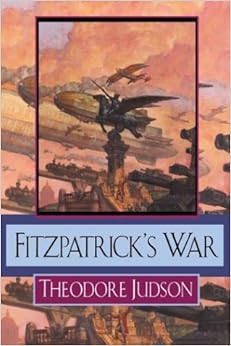This week I'm reviewing a book which was loaned to me by a friend titled Fitzpatrick's War. This is a book set in an alternated twenty-fifth century where the world has gone through some serious changes and the United States is dominated by the Yukon Confederacy, a highly religious and militaristic government. The book itself takes the form of a memoir written by Sir Robert Mayfair Bruce, a military engineer and war hero as well as close personal friend of the Consul Fitzpatrick the Younger. Bruce's account goes against the traditional history the Confederacy knows about Fitzpatrick. I rather enjoy this format because included is annotations from a historian who offers necessary exposition as well as pointing out how Bruce is wrong because of key differences from the official version. Although personally I found myself believing Bruce by the end rather than the pompous Professor Van Buren.
In the world of Fitzpatrick's War technology has become dependent once again on the steam engine. Thanks to a series of conflicts known as the Storm Times, as well as technology used by a mysterious organization known as the Timermen, electrical technology no longer works on Earth. The Yukon Confederacy, which inhabits Australia, the United States, Canada, and Great Britain, benefits from their alliance with the Timermen and have the most advanced technology of the remaining power blocs, but do not have an overwhelming advantage by any stretch of the imagination. In this story we meet Bruce when he is a student at the Confederacy War College and earning extremely high marks in his engineering classes. This brings him to the attention of Lord Fitzpatrick, son of the current Consul of the Yukon Confederacy and heir apparent. Bruce gets brought into Fitzpatrick's circle, which eventually puts him at the center of events in Fitzpatrick's quest to conquer the world.
I think the strongest thing about this book is that some of the characters are really well developed. Bruce is rather likable, and although tempted by power and the benefits of friendship with Fitzpatrick, he retains an element of goodness in him, which is greatly aided with his relationship with his wife, Charlotte. By far Charlotte was probably my favorite character in this book. Granted, her courtship with Bruce basically amounts to her meeting him and deciding, "Yep, I'm going to marry him." but she's got a great personality, sticks up for herself in a patriarchal system, and keeps Bruce grounded when he's most vulnerable. My only regret is she didn't get to be in more of the book than she was because she was an awesome feisty Irish lady but she and Bruce spend a lot of time living apart during the course of the novel. Pularski is also an interesting and I feel very complex character who shows considerable hidden depths despite his outward appearances of just being a bodyguard.
Fitzpatrick is also interesting because he's not a very good person and we can see how that develops over time and the excesses start building up. Especially since Bruce only sees him at different points in Fitzpatrick's life and the changes are far more pronounced than if they'd been gradual. And it's really only with the benefit of hindsight that Bruce is able to analyze from the very beginning and realizes that Fitzpatrick was planning on becoming the next Alexander from the start and was manipulating Bruce's career before Bruce even knew him. Fitzpatrick, like most of the characters, is trained in the classics and is fully aware of Alexander's story, but becomes far more unhinged as time goes on. It's really rather fascinating in that respect.
Over the course of the book I also rather enjoyed Professor Van Buren's protests which became far more strident. By our standards, Van Buren's an outright prude who finds the idea of men dancing with women absolutely disturbing and the parts where Bruce and Charlotte do just that were actually censored from earlier printings in the book's universe. It's almost astounding to see the mental acrobatics Van Buren goes through to deny the destruction of an army of twenty million Chinese which Bruce himself was witness to and a participant in. By the end we even get to learn why Van Buren is so tied to the standard version of events, as the historian who wrote the official version is from his same university. Although extremely distressing to me, also a historian, I found it rather believable and to an extent enjoyable as well.
I will say that really liked the first half or so of the book, which seemed to have a far more natural pacing to it than the latter half. There's a point about two thirds of the way through where the story gets dominated by a battle scene, which is pretty big and important in the overall plot, but for me it felt way too long. The events after the battle scene, compared to the first half of the book, feel considerably rushed. I almost got the feeling the author had more that he wanted to talk about, but just wanted to crank the story out and get it finished. Although if the second part of the book went into as much detail as the first part it probably would have been a much longer book, but I'm not entirely opposed to that.
Overall it's an interesting book that's a little bit different in its own way. If the description of an annotated autobiography of a steampunk future sounds interesting to you, I'd definitely check it out.
- Kalpar


No comments:
Post a Comment